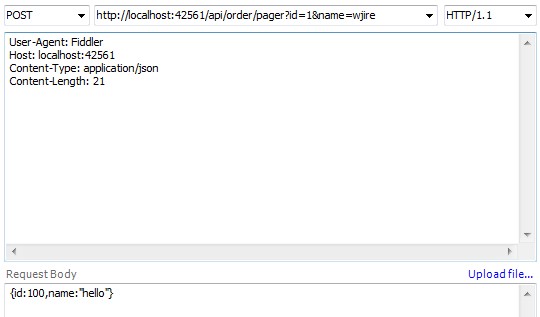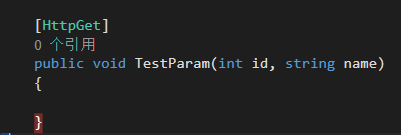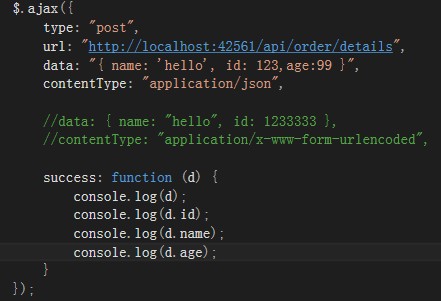一张图说明 Web Api 参数绑定默认规则

请求如下:

控制器如下:

慎重说明:不管请求方式是 get 还是 post , 简单类型的参数,如 name 和 id ,其值都是从 url 里面去取.
Web API 从 url 还是 body 获取 简单类型参数的值,跟客户端提交的方式没有任何关系,只跟 [FromBody] 和 [FromUri] 有关系
这里还有两个需要注意的地方:
1.get 请求
如果是通过 Get 方式获取基础类型参数,比如:

那么,传入的参数个数不能比接收的少,比如:
正确写法:
http://localhost:57895/api/test/TestParam?name=www&id=1
或者
http://localhost:57895/api/test/TestParam?name=www&id=1&age=100
但是,下面这种写法请求不到api
http://localhost:57895/api/test/TestParam?name=www
2.post请求
如果想通过 Post 方式获取基础类型参数,比如:

通常,大家都会这样写:
$.ajax({
type: "post",
url: "http://localhost:42561/api/order/pager",
data: "{ name: 'wjire' }",
contentType: "application/json",
success: function () {
}
});
又或者这样写:
$.ajax({
type: "post",
url: "http://localhost:42561/api/order/pager",
data: { name: "wjire" },
contentType: "application/x-www-form-urlencoded",
success: function () {
}
});
但,都是错的!!
正确写法是这样的:
$.ajax({
type: "post",
url: "http://localhost:42561/api/order/pager",
data: { "": "hello" },
contentType: "application/x-www-form-urlencoded",
success: function () {
}
});
相当恶心的写法,但确实是对的,
但是问题又来了,Web Api 是不支持入参有多个 FromBody 的,也就是说,Web Api只允许一个参数读取请求主体中的数据。
[HttpPost] public bool Pager([FromBody]string NAME, [FromBody] string DES) { return true; }
$.ajax({ type: "post", url: "http://localhost:42561/api/order/pager", data: { "": "hello","":123 }, contentType: "application/x-www-form-urlencoded", success: function () { } });
这种写法,是错误的!
因此,如果是从body中取基本类型参数,我们一般都会封装成实体,如开篇截图的例子.
问题又来了,因为如果我们前后台每次传递多个参数的post请求都去新建一个类的话,我们系统到时候会有很多这种参数类?维护起来那是相当的麻烦的一件事,这时候用 dynamic 是一个不错的选择,如:
$.ajax({ type: "post", url: "http://localhost:42561/api/order/pager", data: '{ name: "hello", id: 123 }', contentType: "application/json", success: function () { } });

其次还可以用 Dictionary ,比如:


不过,貌似没有 dynamic 高级.
实体类参数的传递就简单多了,两种方式:
方式一:
data: { name: "hello", id: 1233333 },
contentType: "application/x-www-form-urlencoded",//可以不写,默认就是这个格式
方式二:
data: "{ name: 'hello', id: 123 }",
contentType: "application/json",



 浙公网安备 33010602011771号
浙公网安备 33010602011771号